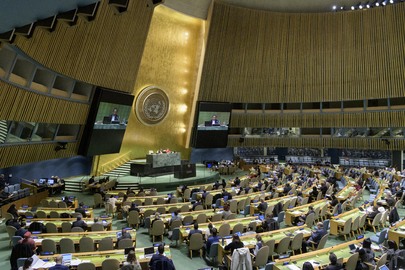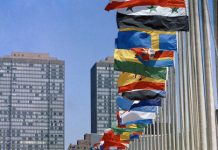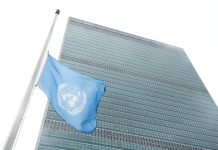Israeli military in spotlight over ‘incommunicado’ detention of Palestinians
A new UN human rights office report published Wednesday into alleged abuses carried out against thousands of Palestinians detained by the Israeli authorities since war erupted in Gaza last October has documented a range of serious violations that may amount to torture.
Testimonies featured in the report highlight abuses including waterboarding and the release of dogs on detainees who were taken by the Israeli military from Gaza, the West Bank and Israel after the 7 October Hamas-led terror attacks.
With more, here’s Jeremy Laurence, spokesperson for the UN human rights office:
“Detainees say they have been held in cage-like facilities, stripped naked for prolonged periods, wearing only diapers. They tell of prolonged blindfolding, deprivation of food, sleep and water, and being subjected to electric shocks and being burnt with cigarettes…. International law requires that all those deprived of their liberty be treated with humanity and dignity, and it strictly prohibits torture or other ill-treatment, including rape and other forms of sexual violence.”
The men, women and children held by Israel included doctors, journalists and human rights defenders, according to the report.
UN human rights chief Volker Türk said that the accounts shared by former detainees and relatives indicated “appalling” treatment. Most of those in detention were held “without charge or trial and …in deplorable conditions”, Mr. Türk added, before pointing to “serious concerns regarding the arbitrariness and the fundamentally punitive nature of such arrests and detention”.
Aid teams lead efforts to tackle a devastating health emergency in Yemen
To Yemen, where the UN World Health Organization (WHO) has kickstarted efforts to combat a rapidly escalating outbreak of acute watery diarrhoea.
The UN health agency said that Yemen has seen a dramatic surge in sickness since mid-March, with nearly 30,000 suspected cases reported in just six weeks.
Heavy seasonal rains have polluted already fragile water and sanitation systems, meaning that “each day currently brings 500 to 1,000 new cases” of sickness, making the situation even more urgent, the WHO said.
Over the next 12 months, the $3 million project funded by Saudi Arabia will directly benefit more than 4.7 million people and indirectly help a further half a million.
Dr Arturo Pesigan, WHO Representative to Yemen, said that the initiative was a “lifeline” for the country’s healthcare system, which has been battered by years of conflict which has left more than 18 million people in need of humanitarian assistance and 4.5 million displaced.
“We aim to swiftly detect and confirm acute watery diarrhoea cases, improve case management, and prevent further transmission among affected communities,” Dr Pesigan explained.
AI ‘set to transform jobs rather than replace workers’, says the UN labour agency
Generative Artificial Intelligence – GenAI – is set to transform jobs without replacing workers, the UN International Labour Organization (ILO) said on Wednesday.
New data from the UN labour agency also indicated that AI could improve productivity in 17 million jobs in Latin America and the Caribbean region, if only internet access and digital network gaps could be fixed.
AI “technology is more likely to augment and transform jobs rather than fully automate them”, the ILO said. It noted that up to 14 per cent of jobs could see productivity improvements thanks to GenAI, while only two to five per cent “are at risk of full automation”.
The UN labour agency emphasized that the workers facing “higher risks” from AI were “women, as well as urban, younger and educated workers in formal sectors” who risked being pushed into accepting informal work, leaving them without social welfare.
Those who stand to benefit from AI include “salaried and self-employed workers – such as salespersons, architects, and those in education, health, or personal services”, the ILO said.
The UN agency repeated its warning that the lack of access to the internet and AI will likely have a greater negative impact on workers living in poverty.
It cited the example of Brazil, where more than eight per cent of workers living in poverty could benefit from GenAI, but less than half would, in fact, as only 40 per cent use digital technologies at work.
Music composed and produced by Joachim Harris. All rights reserved
Source of original article: United Nations (news.un.org). Photo credit: UN. The content of this article does not necessarily reflect the views or opinion of Global Diaspora News (www.globaldiasporanews.com).
To submit your press release: (https://www.globaldiasporanews.com/pr).
To advertise on Global Diaspora News: (www.globaldiasporanews.com/ads).
Sign up to Global Diaspora News newsletter (https://www.globaldiasporanews.com/newsletter/) to start receiving updates and opportunities directly in your email inbox for free.






























